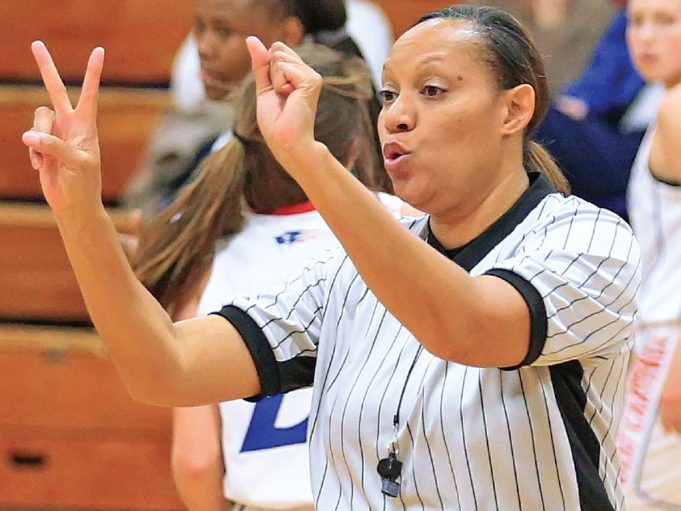O
fficiating has been in my blood since I was a scholastic wrestler during the mid-1960s. Throughout the decades, I gradually began to understand the personal characteristics that all great officials possess. They are human qualities that are based on common-sense behavior. I have developed eight principles for success.
Composure
The official’s professional demeanor under stressful and/or unusual occurrences can be the calming element that alleviates potential unsportsmanlike, irrational responses from coaches, athletes and fans. If officials appear flustered, confused or irritated, they could easily lose both control of the situation and the respect of all involved.
Openness
The official’s communications with all coaches, athletes, scorekeepers and team personnel should be respectful and formal in nature. Don’t be too friendly. On the other hand, don’t display a condescending attitude. Arrogance has no redeeming qualities and only antagonizes others. Be approachable.
Mechanics
It is imperative that you use the correct signals. Just as important, strive to be in the proper position at all times. Coaches are unlikely to question an official who is on top of a difficult call.
You’re going to make mistakes at times; you’re only human. If you can correct the mistake, do so. If the rules don’t have provisions to provide a correction, don’t become defensive when coaches question your error. Be honest and admit you missed the call.
After all, how can you argue when both sides agree? But too many admissions should lead to a self-examination of your mechanics.
Rules knowledge
It is a must to review the rules weekly during the season. The competent official is an expert in the interpretation of the rules. Great coaches are also knowledgeable of the rules. When you are questioned about a rule, you better have in-depth knowledge of its significance. That’ll make you prepared to answer all inquiries. Be a student of the game.
Appearance
Just as the athlete physically prepares himself during the preseason, the official must also do the same. The official’s exercises should include endurance, agility and lateral motion.
The official’s jacket (if appropriate to the sport), shirt and pants should always be cleaned and wrinkle-free. Shoes should be polished before every contest. That presents a professional appearance, demonstrating to the spectators, coaches and competitors that officials mean business and take personal pride in their position of authority.
Decisiveness
Be demonstrative when making each call — be it routine or difficult, exhibiting complete confidence in your decision. Coaches and fans can easily sense if you seem unsure or wavering regarding a call. Be resolute.
Consistency is also a facet of decisiveness. Every sport has its subtle situations that involve an official’s subjectivity: holding in football, the balk in baseball to name a few. Theoretically, every official should indicate those infractions in the same manner. In reality, such is not the case. No two officials perceive situations with identical judgment.
The key is individual official consistency. My area of officiating expertise is wrestling. While some referees are more liberal, others tend to be more moderate in their view of stalling. That’s OK, as long as that official is consistent from match to match.
Superior coaches not only scout their opponents, but also the officials who oversee their competitions. They respect an official who is consistent, even if they tend to disagree with the official’s overall philosophy. At least they know what to expect. Inconsistency in officiating frustrates coaches in all sports.
Enthusiasm
Officials should emanate a demeanor of excitement in performing the trade, no matter the level of competition to which they are assigned. In doing so, the athletes feel a sense of pride in the skills that they have developed, knowing that the official sincerely appreciates their dedication to the sport.
Safety
Adept officials check that participants are legally equipped prior to an event, especially when it involves contact sports. Likewise, they are constantly prepared for the unexpected. For example, the observant official can sense if there is friction between opponents and is ready to step between combatants to quell potential problems.
As a state rules interpreter for nearly three decades, I incorporated those principles to evaluate hundreds of officials. I found them to be beneficial for developing competent and compassionate officials.
Officiating is an admirable and rewarding avocation. It is also a challenging endeavor. To be honest, not everyone has the essential characteristics needed to be an official. It takes individuals who can ignore criticism, knowing they will never be able to please everyone. Exceptional officials perform their duties for the love of the sport and its participants.
What's Your Call? Leave a Comment:
Note: This article is archival in nature. Rules, interpretations, mechanics, philosophies and other information may or may not be correct for the current year.
This article is the copyright of ©Referee Enterprises, Inc., and may not be republished in whole or in part online, in print or in any capacity without expressed written permission from Referee. The article is made available for educational use by individuals.



















